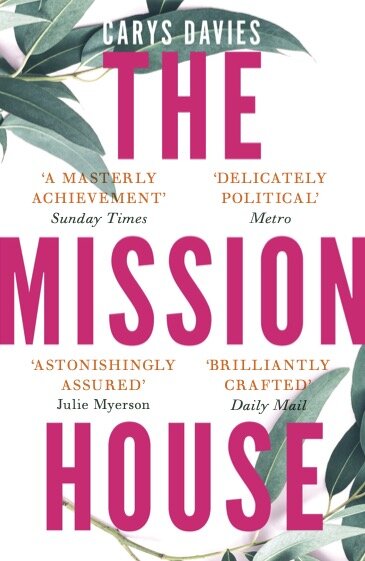The Mission House
Carys Davies
(Granta, 2021); pbk: £12.99
Carys Davies is a novelist and writer of short stories with an impressive array of accolades. I approached her latest novel The Mission House with curiosity and found myself completely immersed in the wistful, gently paced narrative. That is not to say that the novel is lacking; Davies weaves the plot in a temporal structure that comfortably outpaces the reader, and while the lyricism and imagery in the tightly pruned chapters project a magical aura of India, the allegory is a backdrop of post-colonialism and modern political rumblings which hang in the air like humidity; not quite visible yet distinctly discomforting.
In the opening chapter we experience the ‘claggy, oppressive heat of the plains’ of southern India through the eyes of protagonist, Mr Hilary Byrd; an anxious, depressed librarian from England on a journey of recovery. Byrd is struggling to make sense of himself and the progression of modern life in Britain as well as cope with the heat and bustle of the ‘cities of the interior […] alive with unbearable numbers of people and cars and scooters, bright light and noise, horns and clatter and endless beeping, […]’.
To escape the heat, Byrd boards a train to Ooty, a former British hill station, where the air is ‘chilly and fresh’. Davies broaches poverty and racism from the outset as Hilary Byrd steps onto the terminus and dodges the rickshaw drivers because ‘he hated the way these people made him feel both guilty and afraid’. Avoiding eye contact, Byrd sees ‘a pair of dirty feet, one wearing a black flip-flop and the other a red plastic clog’ belonging to Jamshed, who inadvertently becomes rescuer and confidant, as he ferries Byrd around Ooty. Nevertheless, racial disparities are maintained: it is always to the back of Jamshed’s head that Byrd discloses his innermost thoughts.
Byrd rents the old mission house in the grounds of the Presbytery after a chance meeting with the local Padre on the train. After ‘a few short hours’ Byrd quickly feels at home while ‘the only irritating thing was the black dog’, Ooly, a fitting metaphor for Byrd’s melancholy. Davies engages the reader as active participant with subtle foreshadowing and a narrative peppered intermittently with chapters narrated in the future tense which evoke an unsettling ambience; something has happened, but the details remain to be seen. We first feel perturbed when Byrd ‘noticed the other man’s clothes, hanging limply from a forked hook on the back of the bedroom door’. This image is ever present in the bungalow, it’s shadow lengthening as the plot progresses.
Davies’s characters are complex, and we come to know them through the juxtaposition of their private and public personas. The Padre discusses his concerns about his adopted daughter, Priscilla, through his private musings to his dead wife. We only learn of Priscilla’s love of Country and Western music and her life’s dream when she is alone. Jamshed studiously teaches himself to write through his observations of Hilary Byrd, while his work ethic comes from the drive to support his nephew, Ravi. As for Byrd himself, we gain further insights to his character from the letters he sends to his sister and carer, Wynn.
One might expect a dose of the mythical and spiritual facets of India given the title, however it soon becomes apparent this is not the case. In a sad and unexpected twist of fate, all that Hilary Byrd holds magical is stripped away, but nevertheless:
It seemed to Hilary Byrd that in spite of his terrible disappointment, his time here in the hills had done him good.
Wanda McGregor


Leave a Reply